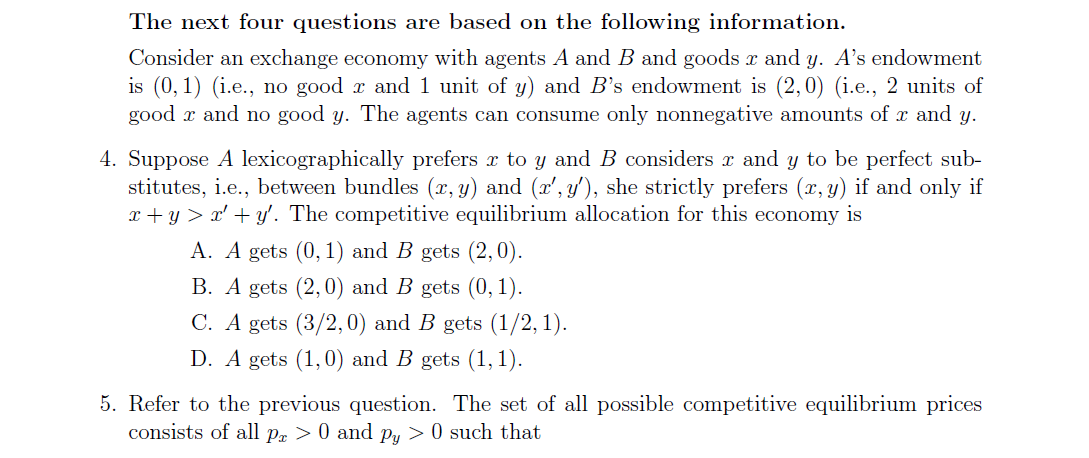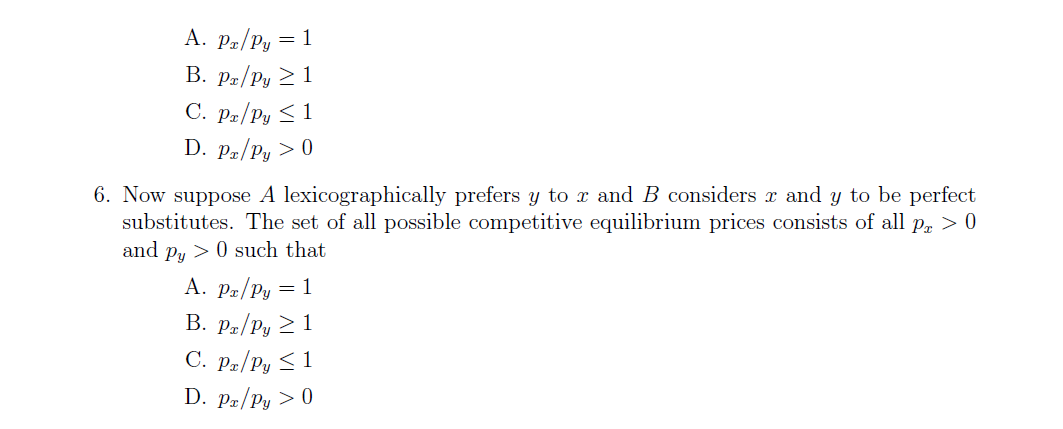The next four questions are based on the following information. Consider an exchange economy with agents A and B and goods x and y. A's endowment is (0, 1) (i.e., no good r and 1 unit of y) and B's endowment is (2,0) (i.e., 2 units of good x and no good y. The agents can consume only nonnegative amounts of x and y. 4. Suppose A lexicographically prefers x to y and B considers r and y to be perfect sub- stitutes, i.e., between bundles (x, y) and (x', y'), she strictly prefers (x, y) if and only if x + y > x' + y'. The competitive equilibrium allocation for this economy is A. A gets (0, 1) and B gets (2, 0). B. A gets (2,0) and B gets (0, 1). C. A gets (3/2, 0) and B gets (1/2, 1). D. A gets (1,0) and B gets (1, 1).
The next four questions are based on the following information. Consider an exchange economy with agents A and B and goods x and y. A's endowment is (0, 1) (i.e., no good r and 1 unit of y) and B's endowment is (2,0) (i.e., 2 units of good x and no good y. The agents can consume only nonnegative amounts of x and y. 4. Suppose A lexicographically prefers x to y and B considers r and y to be perfect sub- stitutes, i.e., between bundles (x, y) and (x', y'), she strictly prefers (x, y) if and only if x + y > x' + y'. The competitive equilibrium allocation for this economy is A. A gets (0, 1) and B gets (2, 0). B. A gets (2,0) and B gets (0, 1). C. A gets (3/2, 0) and B gets (1/2, 1). D. A gets (1,0) and B gets (1, 1).
Chapter1: Introducing The Economic Way Of Thinking
Section: Chapter Questions
Problem 7SQ
Related questions
Question
The question is attached in the image below. Note that that options for Q5 is attached in the second image.
Please provide a 'mathematical' as well figurative proof for your answers (please solve for

Transcribed Image Text:The next four questions are based on the following information.
Consider an exchange economy with agents A and B and goods r and y. A's endowment
is (0, 1) (i.e., no good r and 1 unit of y) and B's endowment is (2,0) (i.e., 2 units of
good x and no good y. The agents can consume only nonnegative amounts of x and y.
4. Suppose A lexicographically prefers r to y and B considers r and y to be perfect sub-
stitutes, i.e., between bundles (x, y) and (x', y'), she strictly prefers (x, y) if and only if
x + y > x' + y'. The competitive equilibrium allocation for this economy is
A. A gets (0, 1) and B gets (2,0).
B. A gets (2,0) and B gets (0, 1).
C. A gets (3/2, 0) and B gets (1/2, 1).
D. A gets (1,0) and B gets (1, 1).
5. Refer to the previous question. The set of all possible competitive equilibrium prices
consists of all pr > 0 and Py > 0 such that

Transcribed Image Text:A. Pz/Py = 1
В. р-/Ру — 1
C. Pe/Py < 1
D. Pa/Py > 0
6. Now suppose A lexicographically prefers y to x and B considers r and y to be perfect
substitutes. The set of all possible competitive equilibrium prices consists of all Pa > 0
and p, >0 such that
A. Pa/Py = 1
B. Pa/Py > 1
C. Pz/Py < 1
D. Pz/Py > 0
Expert Solution
This question has been solved!
Explore an expertly crafted, step-by-step solution for a thorough understanding of key concepts.
Step by step
Solved in 6 steps

Recommended textbooks for you








